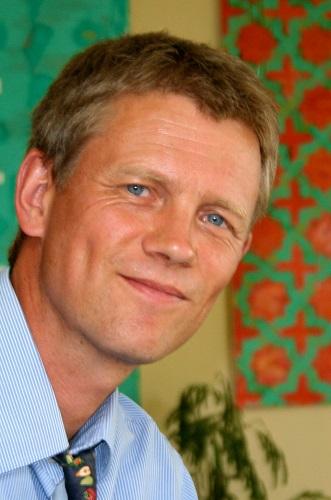Meeting Bill Gates in the lift
Imagine that you were to meet Bill Gates in a lift. You strike up a conversation and he asks you what you do. As it happens, you have just come up with an idea that you believe could change the world. In the approximately two minutes until the elevator reaches your floor, you decide to try to convince him that he should invest in your idea. What would you say?

Hovedinnhold
In my research group, we call this the two-minute test. It involves being able to summarise any project, idea – or the result of three years’ work –in just two minutes.
In our academic environment there are three reasons to use Bill Gates as an example. First, he is the world’s richest person, with a fortune of NOK 740 billion. Second, he is a clever man himself and has, himself, come up with an idea that changed the world. Third, Gates spends a large proportion of his wealth on investments in health, education and development in the world’s low-income countries. He deeply believes that new technology, innovative research and better solutions can make a difference.
Professor Norheim will give one of the keynotes at BSRS 2017.
Bill Gates was one of the first to invest and support a global vaccination fund for children (a project called Gavi – The Vaccination Alliance). This project has been frequently cited as an example of one of the world’s smartest investments by former Norwegian Prime Minister, Jens Stoltenberg. Recently, Gates was in Davos with Prime Minister Erna Solberg to talk about financial support for the newly established vaccine initiative, Coalition for Epidemic Preparedness Innovations (CEPI), which is an initiative that both he and the Norwegian Government support. The importance of investing in vaccination initiatives was recently demonstrated during the outbreak of Ebola in West Africa. It was made clear that we are not well enough prepared for major epidemics. Ebola is only one example of our lack of preparedness, the Zika virus is another, and a new and serious influenza epidemic is a third.
Market failure
The economists Dean Jamison and Larry Summers have stated that if there were to be a new global influenza pandemic such as the Spanish Flu that raged from 1918 to 1920, there would be insufficient global capacity to produce vaccines to stop the epidemic.
The reason is that it is not profitable for the world’s vaccine producers to invest in contingency plans; the risk of a new pandemic of this kind is too low. Unfortunately, however, it is not zero. Summers and Jamison would describe this situation as a market failure, whereby the market is unwilling to produce sufficient public goods of this type. A “public good” is defined as a product that can be consumed by a person without reducing its availability for any another person and is something from which no-one is excluded. Parks, public libraries and vaccines are typical examples. There can be many examples of such goods, but they do not appear spontaneously of themselves – someone or some organisation needs to invest in their establishment.
Responsibility
The Norwegian doctor, John-Arne Røttingen, is one of the founders of CEPI. Last summer The Lancet published an article where his research results showed an almost 100 percent level of effectiveness for a vaccine against Ebola. The vaccine had existed before the outbreak of the epidemic, but it had not been tested because its development and production had not been considered profitable, and thus, tragically, the world was unprepared.
Someone has to take responsibility for producing public goods such as vaccines. Røttingen has probably had many ideas and been in many lifts. According to the Norwegian newspaper, Aftenposten, the level of investment in CEPI has now reached approximately NOK 4 billion. Japan, Germany and the Welcome Foundation have all added to Norway’s contribution of NOK 1 billion.
Ethics
What does this have to do with ethics? If you were to meet Bill Gates in a lift, you should know that he is a businessman with a thorough understanding of market mechanisms, market failure and the need to secure public goods. He is also a philanthropist and as a philanthropist, he is fundamentally motivated by two ethical principles. First, he is a cosmopolitan: He believes that everyone deserves the opportunity to lead a productive and healthy life, regardless of where they are born or where they live. He has written this as a motto at the entrance to the Gates headquarters in Seattle. A person who is a cosmopolitan believes that unequal opportunities across national borders are unfair and measures should be taken to correct for this.
Second, Gates is a utilitarian and believes that resources should be invested where they will be of the most benefit for the most number of people. He is therefore a strong supporter of cost-effectiveness analyses. When he donates money he believes it should be used as cost efficiently as possible. His Foundation supports technology and measures that are extremely cost efficient, such as the prevention and treatment of malaria, pneumonia, diarrhoea and HIV. It does not support less cost efficient measures such as the treatment of cancer or cardiovascular diseases, which Bill Gates considers to be an inefficient use of scarce resources.
Values
In a famous interview in the magazine The New Yorker (2005), Gates told the story of something that had had the greatest influence on him and his wife Melinda when they decided to give away most of their wealth. It was a short report from the World Bank called «Investing in Health», written in 1993 by a team that included the young doctor, Chris Murray, and the economist, Dean Jamison. Murray now leads the Global Burden of Disease project, while Jamison leads Disease Control Priorities, 3rd Edition. Gates says he was shocked when he realised that there are medical treatments in existence that cost less than USD 100 per saved life – and the world is not investing in them.
Should we all share Bill Gates’ ethical values? Should we all be cosmopolitan, utilitarian philanthropists? Not necessarily. For example, I, personally, agree with a cosmopolitan sense of justice, but I am not a utilitarian. A fair distribution of health is about more than the greatest possible benefit for as many people as possible, and redistribution is the responsibility of States, not only philanthropists. However, I would love to meet Bill Gates in a lift – preferably to the top of a very tall building! I would have loved to have had an opportunity to discuss ethics with him.

